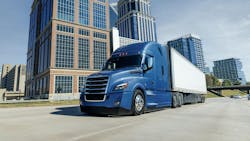Freightliner produces milestone 1 millionth Cascadia
Freightliner celebrated a milestone by producing the one millionth Freightliner Cascadia, the first Class 8 truck in North America to reach the seven-figure mark, according to parent company Daimler Truck North America.
“For more than 80 years, Freightliner has been dedicated to serving its customers with purposeful and innovative transportation solutions to help businesses succeed,” said David Carson, SVP of sales and marketing at DTNA. “When the Freightliner Cascadia launched in 2007, it was designed to do exactly that, and we are incredibly grateful to our customers who have placed their trust in the Cascadia and Freightliner to help us reach the 1 million mark. With our flagship Cascadia, our commitment to making a safer, cleaner, and more cost-efficient solution for our customers has never wavered. And we are not done yet.”
What started as an idea to develop a truck with new aerodynamic, lightweight, and uptime-improving features has since evolved through four generations of the platform. It has earned its status as the market-leading Class 8 commercial truck through innovations designed for driver comfort, increased safety, and reduced fuel consumption. Since its original introduction, the Cascadia has improved its fuel efficiency by more than 35%.
The Cascadia continues to be a trailblazer for innovative features in the industry and the foundation for transformative projects at DTNA. For example, the Cascadia serves as the vehicle base for the SuperTruck initiative, the multi-year co-funded project by the Department of Energy that investigates next-generation technologies for heavy-duty commercial trucks and potential product integration into series production trucks. The battery-electric Freightliner eCascadia, launched in 2022, has driven over 6 million miles with customers across more than 50 fleets in the U.S.
Looking even further into the future, DTNA also designed an autonomous-ready Cascadia with redundant safety features, including braking and steering, for a truck tailor-made for autonomous driving functionalities and prepared for the integration of any virtual driver. Currently, the autonomous-ready Cascadia is being tested as a self-driving truck in real-world operations by Torc Robotics, an independent subsidiary of DTNA, since 2019, setting standards for safety on the road.
See also: Schneider achieves 1 million zero-emission miles with the Freightliner eCascadia
Key product developments throughout the history of the Freightliner Cascadia:
- First Generation Cascadia debuted with the Detroit DD15 (2007): Introduced the all-new Cascadia with the heavy-duty Detroit Diesel DD15 engine platform, which offered excellent performance, improved fuel consumption, and industry-leading power.
- Second Generation Cascadia ‘Evolution’ launched (2012): Unveiled the second-generation Cascadia series engineered to increase fuel efficiency. The launch included the introduction of the Detroit DT12, an automated manual transmission that combined the operational ease of an automatic with the efficiency of a manual transmission.
- Detroit Connect introduced (2013): The introduction of Detroit Connect brought the first OEM-provided, factory-installed connectivity suite to the Cascadia.
- Detroit Assurance launched (2015): Detroit Assurance offered the first OEM-designed proprietary suite of safety systems, fully integrating the Detroit powertrain with safe driving innovations for higher safety and performance in the Cascadia.
- Freightliner Inspiration Truck debuted (2015): Utilized the Freightliner Cascadia as a framework for the first licensed automated commercial truck.
- SuperTruck I unveiled (2015): Freightliner, DTNA, and its project partners exceeded program goals and demonstrated more than 115% improvement in overall freight efficiency over a 2009 baseline truck.
- Third Generation Cascadia launched (2017): The third generation Cascadia brought advanced aerodynamics, improved safety features, connectivity advancements, and driver comfort enhancements to meet the evolving needs of fleets and drivers.
- Fourth Generation Cascadia with SAE L2 capabilities introduced (2019): Becomes the first heavy-duty truck in series production in North America with automated feature enhancements capable of both lateral (steering) and longitudinal (acceleration/deceleration) control.
- Right-hand drive Cascadia launched (2019): Right-hand drive versions of the Freightliner Cascadia became available in international markets like Australia.
- Freightliner eCascadia production started (2022): The battery-electric truck, which was initially revealed in 2019 as a customer test vehicle, enters series production.
- SuperTruck II launched (2023): Continued improvements are made in efficient freight design and aerodynamics through the SuperTruck program, co-funded by the DOE. The U.S. Department of Energy also announces funding for the Freightliner SuperTruck III program, slated to be unveiled in 2027.
- Freightliner Cascadia reaches 1 million: The Cascadia continues to be the most advanced truck ever designed by Freightliner.
“Backed by an expansive dealer support network, which includes nearly 500 locations across North America, the Freightliner Cascadia continues to faithfully serve all those who keep the world moving, and we’re looking forward to reaching the 2 million mark,” Carson said.
About the Author
FleetOwner Staff
Our Editorial Team
Kevin Jones, Editorial Director, Commercial Vehicle Group
Josh Fisher, Editor-in-Chief
Jade Brasher, Senior Editor
Jeremy Wolfe, Editor
Jenna Hume, Digital Editor
Eric Van Egeren, Art Director
